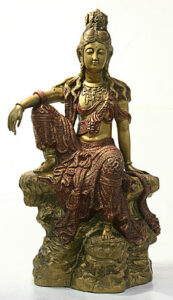Acupuncture for Allergic Asthma: German Large Scale Study
Kristen Sparrow • May 04, 2017


In this large study, 3 months, 15 acupuncture sessions improved patients’ asthma compared to controls and the improvement lasted for at least 6 months. This is a trend we are seeing in Acupuncture studies, that the effect lasts way beyond the last treatment session. In my opinion, this shows the “sturdiness” or improved resilience of the system.
But this “long tail” is also a crucial factor in comparing the cost of acupuncture treatment. Clearly, acupuncture can be more expensive than medications over the 3 months of treatment. But if that acupuncture treatment lasts for up to a year, that cost is cut down by 4. And if there is a “cure” , as happened in my own case, then the cost is negligible.
Acupuncture for Allergy and Asthma Witt 2017
Acupuncture in Patients with Allergic Asthma:
A Randomized Pragmatic Trial
Benno Brinkhaus, MD,
Claudia M. Witt, MD, MBA
1,3
Journal of Alternative and Complementary Therapies
Volume 23, Number 4, 2017, pp. 268–277ª
“Background: Although the available evidence is insufficient, acupuncture is used in patients suffering from chronic asthma. The aim of this pragmatic study was to investigate the effectiveness of acupuncture in addition to routine care in patients with allergic asthma compared to treatment with routine care alone.
Methods: Patients with allergic asthma were included in a randomized controlled trial and randomized to receive up to 15 acupuncture sessions over 3 months or to a control group receiving routine care alone. Patients who did not consent to randomization received acupuncture treatment for the first 3 months and were followed as a cohort. All trial patients were allowed to receive routine care in addition to study treatment. The primary endpoint was the asthma quality of life questionnaire (AQLQ, range: 1–7) at 3 months. Secondary endpoints included general health related to quality of life (Short-Form-36, SF-36, range 0–100). Outcome parameters were assessed at baseline and at 3 and 6 months.
Results: A total of 1,445 patients (mean age 43.8 [SD 13.5] years, 58.7% female) were randomized and included
in the analysis (184 patients randomized to acupuncture and 173 to control, and 1,088 in the nonrandomized
acupuncture group). In the randomized part, acupuncture was associated with an improvement in the AQLQ score
compared to the control group (difference acupuncture vs. control group 0.7 [95% confidence interval (CI) 0.5–
1.0]) as well as in the physical component scale and the mental component scale of the SF-36 (physical: 2.5 [1.0–
4.0]; mental 4.0 [2.1–6.0]) after 3 months. Treatment success was maintained throughout 6 months. Patients not
consenting to randomization showed similar improvements as the randomized acupuncture group.
Conclusions: In patients with allergic asthma, additional acupuncture treatment to routine care was associated
with increased disease-specific and health-related quality of life compared to treatment with routine care alone.
Keywords: acupuncture, allergic asthma, routine care, complementary medicine, randomized controlled trial, pragmatic
trial, comparative effectiveness research
268

